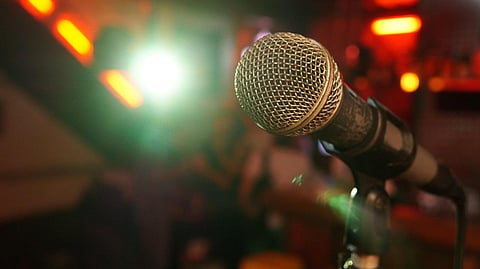

BENGALURU: Around the time Comicstaan Season 1 (2018) came out, it increased the number of comics in the city exponentially. To accommodate everyone, comics started opening more rooms and began producing mics. For my own survival and to increase my stage time, even I did. Eventually, there were a lot of rooms for standup and that is when the conversation slowly started to shift towards making a profit out of mics, getting an income and producing full-blown shows,” shares Akshay Paraikkal, a 30-year-old standup comedian in Bengaluru.
What Paraikkal was referring to at the end by ‘getting an income’ was that a discussion was raging among the city’s standup circles on whether to start charging a comedian for performing on the stage. This is a common occurrence in India’s big-time standup cities like Delhi and Mumbai, where a budding comic pays money to the open mic’s producer in exchange for stage time. Bengaluru, also a place in the ethos of comedy fans as a major city for standup in India, did not follow suit.
The comedy scene is more democratised and anyone wanting to do standup do not have to pay in any rooms of the city. All thanks to comedians in the city who raised their voices when the prospect of having paid mics was brought up. Sparsh Kumar Sinha (29) was one of the first comics to do so. “When I started, there were some mixed open mics (a mix of comedy, poetry and music) which were paid.
They exist even now. But we created a parallel scene. When the issue of paying for an open spot was raised, we were against it as it’s not like the mic itself was making any money. What’s the point of charging then? Open mics can’t guarantee audiences, so charging comics on the mere possibility of an audience did not make sense,” he says.
“We also didn’t want to create a class divide. We have comics from all age groups. There were comedians who had high paying jobs, comedians who had just stepped into the workforce and also ones who were just students. Charging money for mics would mean the more well-to-do comics would get more stage time, which did not sound fair to the others,” adds Paraikkal.
A major reason why open mics in other cities charge money is survival. Standup is still a relatively new artform in India, so venues, dedicated to standup, need to make money to stay afloat. As the scene is new, so are its audiences. Hence, rooms started charging comedians so that the room could prolong its lifeline.
On how some of the producers (who are primarily comedians) were able to bypass this limitation, Somnath Padhy (31), another comedian in the city who has been doing standup since 2015, explains, “Getting people organically from the street is a much better way for open mics. And the city’s café culture has really helped us get interested audiences often.
You can always find places/cafés that don’t charge rent. On top of that, we have been running certain rooms for ages at this point, so we have a good relationship with them as well. Fortunately, I never had to face too many problems when producing mics. The eateries make money through the audiences and not the performers. But I understand why the paid model exists in other cities.”
Coanan Pasha, a 29-year-old comedian, who moved to the city a few years ago after a stint in Pune, is thankful for the cashless system. “I came from Pune where comics pay for spots. Although I didn’t have to as I went through a friend. But after shifting here, the cashless system helped me get so much stage time. When you have a day job, paying for spots restricts you. But this city gives you as much stage time as needed,” says Pasha, who hails from Hubballi.